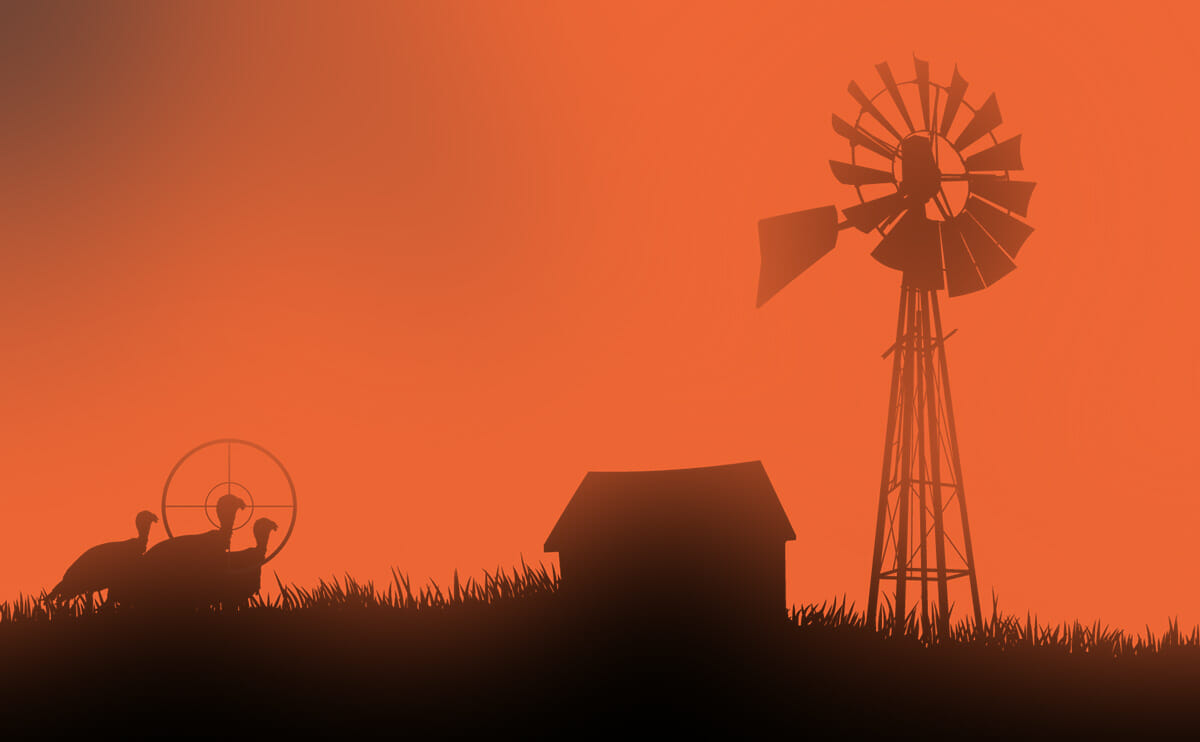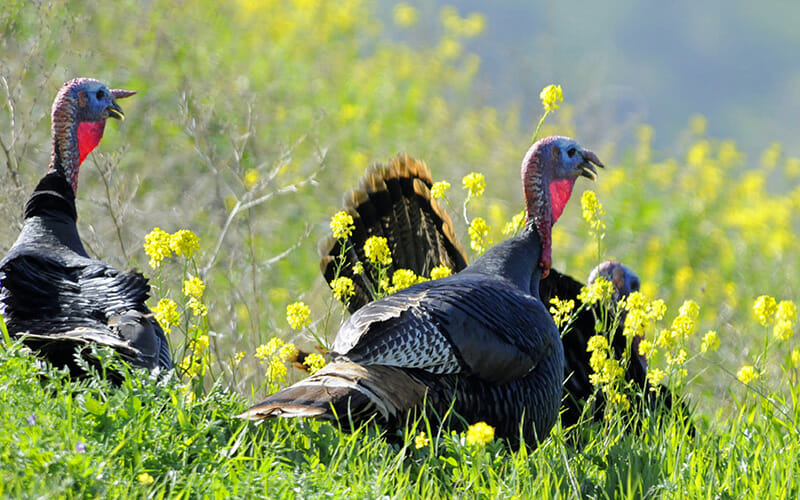Turkey Wars: Farmers vs. Wild Turkeys
With blue heads, bright red wattles and spectacular tiers of bronze, black and beige feathers, wild turkeys can be exceptionally beautiful creatures. Benjamin Franklin himself, in ...
Turkey Wars: Farmers vs. Wild Turkeys
With blue heads, bright red wattles and spectacular tiers of bronze, black and beige feathers, wild turkeys can be exceptionally beautiful creatures. Benjamin Franklin himself, in ...

With blue heads, bright red wattles and spectacular tiers of bronze, black and beige feathers, wild turkeys can be exceptionally beautiful creatures. Benjamin Franklin himself, in a letter to his daughter in 1784, wrote that the turkey, compared to the bald eagle, was “a much more respectable Bird.”
While they once roamed most of the United States and Canada, the birds were essentially wiped out by the early 1900s, as hungry settlers hunted the birds for dinner and land was cleared to make way for agricultural land and cities. Through reintroduction programs started in the 1940s, mostly by hunters, their numbers began to climb again, setting the stage for what was perhaps an inevitable showdown: farmers versus wild turkeys.
Depending on who you ask, the birds are either marauding, wily animals that ruin crops and contaminate cattle feed as they roam across farmland in huge packs. Or they’re gorgeous, sensitive birds that are a delight to hunt and unfairly blamed for crop damage inflicted by deer and raccoons. Everyone does agree on one thing: numbers of wild turkeys are increasing in many parts of North America, from Ontario, where they’ve gobbled grapes off entire vineyards, to Staten Island, NY. And it’s making farmers nervous.
Depending on who you ask, the birds are either marauding, wily animals that ruin crops and contaminate cattle feed as they roam across farmland in huge packs. Or they’re gorgeous, sensitive birds that are a delight to hunt and unfairly blamed for crop damage inflicted by deer and raccoons.
Take Maine, for instance.
“The turkeys are doing damage, there’s no doubt about that,” says Maine Farm Bureau executive secretary Jon Olson, who recently testified in favor of a bill expanding that state’s turkey hunt. To kickstart a hunting season on the birds in the late 1970s, Maine’s inland fisheries and wildlife department trapped 41 wild turkeys in Vermont and set them loose in two counties. Their population has since boomed to between 50,000 and 60,000.
Olson says he’s heard myriad horror stories from farmers, including a dairy farmer whose plastic-wrapped hay rotted after being pecked, a vegetable farmer who saw turkeys eat all the emerging shoots of his oat field, and one potato grower who saw wild turkeys dig up and destroy a field of freshly planted potato seed.
The most popular apple in his state, according to Olson, is the honeycrisp. Unfortunately, he adds, it’s also the turkeys’ favorite. “One wild turkey will fly up to the tree and shake it, and others will come up and eat the fallen apples.”
Giving testimony at the same hearing, organic farmer and Democratic politician Craig Hickman said he used to like the birds, but changed his mind once they went after his collard greens. “Then I had enough,” he said to the Bangor Daily News. “Because if you know me, you know I like collard greens.”
While that particular piece of legislation failed, inland fisheries and wildlife biologist and go-to Maine turkey expert Brad Allen (his friends call him “Big Bird”) says they’ve been increasingly trying to smooth the relationship between the two groups. “If you put a favored food item in front of a wild animal in the northeast you are going to have some issues. It’s understandable that [farmers are] not going to be wild about wild turkeys.”

The challenge, however, is that farmer cooperation is critical to the success of the state’s profitable turkey hunt, so many farmers feel they should have a say in hunting regulations and legislation. While some hunters own farmland, most depend on free access to agricultural lands in order to pursue the birds. The farm bureau’s Olson is emphatic on this point. “Farmers receive no economic benefit from turkey hunting. It’s a cost to them.”
As a result, Allen says his department tries to bend over backwards to accommodate aggrieved farmers. While he thinks the issues are a bit overstated, he says that “doesn’t mean they’re not legitimate.” He also says the birds are sometimes unfairly scapegoated.
And he’s not the only one who thinks so. Turkey troubles have farmers up in arms, but researchers say the bird is getting a bad rap.
In an oft-quoted 2004 study from Indiana’s Purdue University, researchers equipped white-tailed deer, raccoons and wild turkeys with tracking devices and monitored fields for two years. Those researchers concluded that the birds, which feed in the daytime, will show up at the scene of an overnight crime committed by a deer or a raccoon and be unfairly blamed.
Janice Gardner, who studied the relationship between Maine blueberry farmers and the birds for her 2009 Master’s thesis, says she has more of a nuanced perspective.
“Oh yeah. They eat blueberries, there’s no doubt about that,” she says. The trick, according to her, is communicating to farmers how little damage turkeys do, at least relative to other animals and to the total crops they could potentially eat.
For her study, Huebert tracked numbers of birds she saw in fields and the size of the field. Extrapolating that with the energy requirements for a wild turkey, she concluded that on a 20-hectare field wild turkeys were eating 18.7 kilograms, or about $30 worth, of blueberries, totaling a 0.5 per cent crop loss.
The problem may be perception. “Wild turkeys are big and they’re out during the daytime and they’re out in flocks,” says Huebert. “Because they are so visible it’s easy to point a finger at them, but perhaps that’s not the whole story.”
Correction: A previous version of this story incorrectly identified Janice Gardner by her maiden name.
Follow us
This work is licensed under a Creative Commons Attribution-NoDerivatives 4.0 International License.
Want to republish a Modern Farmer story?
We are happy for Modern Farmer stories to be shared, and encourage you to republish our articles for your audience. When doing so, we ask that you follow these guidelines:
Please credit us and our writers
For the author byline, please use “Author Name, Modern Farmer.” At the top of our stories, if on the web, please include this text and link: “This story was originally published by Modern Farmer.”
Please make sure to include a link back to either our home page or the article URL.
At the bottom of the story, please include the following text:
“Modern Farmer is a nonprofit initiative dedicated to raising awareness and catalyzing action at the intersection of food, agriculture, and society. Read more at <link>Modern Farmer</link>.”
Use our widget
We’d like to be able to track our stories, so we ask that if you republish our content, you do so using our widget (located on the left hand side of the article). The HTML code has a built-in tracker that tells us the data and domain where the story was published, as well as view counts.
Check the image requirements
It’s your responsibility to confirm you're licensed to republish images in our articles. Some images, such as those from commercial providers, don't allow their images to be republished without permission or payment. Copyright terms are generally listed in the image caption and attribution. You are welcome to omit our images or substitute with your own. Charts and interactive graphics follow the same rules.
Don’t change too much. Or, ask us first.
Articles must be republished in their entirety. It’s okay to change references to time (“today” to “yesterday”) or location (“Iowa City, IA” to “here”). But please keep everything else the same.
If you feel strongly that a more material edit needs to be made, get in touch with us at [email protected]. We’re happy to discuss it with the original author, but we must have prior approval for changes before publication.
Special cases
Extracts. You may run the first few lines or paragraphs of the article and then say: “Read the full article at Modern Farmer” with a link back to the original article.
Quotes. You may quote authors provided you include a link back to the article URL.
Translations. These require writer approval. To inquire about translation of a Modern Farmer article, contact us at [email protected]
Signed consent / copyright release forms. These are not required, provided you are following these guidelines.
Print. Articles can be republished in print under these same rules, with the exception that you do not need to include the links.
Tag us
When sharing the story on social media, please tag us using the following: - Twitter (@ModFarm) - Facebook (@ModernFarmerMedia) - Instagram (@modfarm)
Use our content respectfully
Modern Farmer is a nonprofit and as such we share our content for free and in good faith in order to reach new audiences. Respectfully,
No selling ads against our stories. It’s okay to put our stories on pages with ads.
Don’t republish our material wholesale, or automatically; you need to select stories to be republished individually.
You have no rights to sell, license, syndicate, or otherwise represent yourself as the authorized owner of our material to any third parties. This means that you cannot actively publish or submit our work for syndication to third party platforms or apps like Apple News or Google News. We understand that publishers cannot fully control when certain third parties automatically summarize or crawl content from publishers’ own sites.
Keep in touch
We want to hear from you if you love Modern Farmer content, have a collaboration idea, or anything else to share. As a nonprofit outlet, we work in service of our community and are always open to comments, feedback, and ideas. Contact us at [email protected].by Karen Pinchin, Modern Farmer
June 24, 2013
Modern Farmer Weekly
Solutions Hub
Innovations, ideas and inspiration. Actionable solutions for a resilient food system.
ExploreExplore other topics
Share With Us
We want to hear from Modern Farmer readers who have thoughtful commentary, actionable solutions, or helpful ideas to share.
SubmitNecessary cookies are absolutely essential for the website to function properly. This category only includes cookies that ensures basic functionalities and security features of the website. These cookies do not store any personal information.
Any cookies that may not be particularly necessary for the website to function and are used specifically to collect user personal data via analytics, ads, other embedded contents are termed as non-necessary cookies.